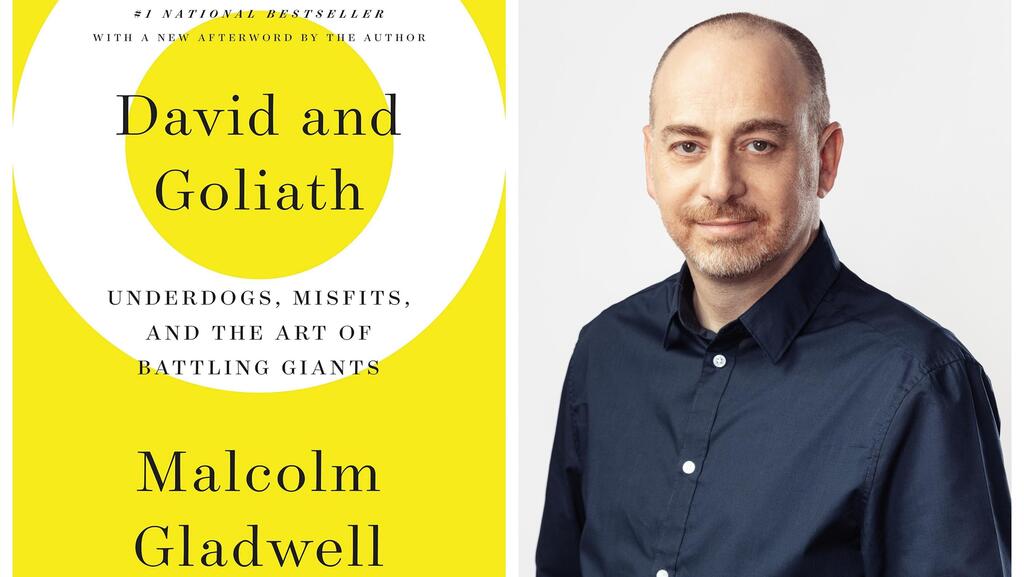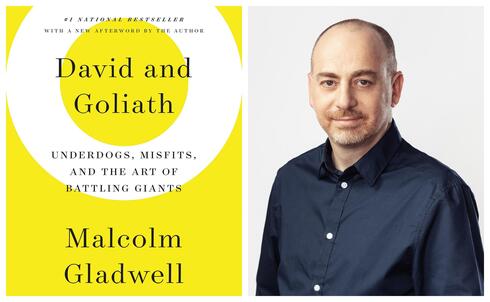
BiblioTech
CTech's Book Review: Embracing adversity as the underdog
Roy Bachar, Chief Business Officer at Upstream Security, has joined CTech to share a review of “David and Goliath: Underdogs, Misfits, and the Art of Battling Giants” by Malcolm Gladwell.
Roy Bachar is the Chief Business Officer at Upstream Security, which provides a cloud-based automotive cybersecurity solution for protecting connected vehicles from cyber threats. He has joined CTech to share a review of “David and Goliath: Underdogs, Misfits, and the Art of Battling Giants” by Malcolm Gladwell.
Title: “David and Goliath: Underdogs, Misfits, and the Art of Battling Giants”
Author: Malcolm Gladwell.
Format: Book
Summary:
Strengths and weaknesses, advantages and disadvantages aren't always what they seem to be on the surface. Sometimes what we perceive as an advantage turns out to be a disadvantage – and vice versa. Attempting to play the Goliath’s game seldom succeeds. The Davids must use creative strategies to defeat the Goliaths. However, most underdogs do not fight like Davids because they accept the game's rules as stated by the dominating players.
The book has three parts where the author discusses the advantages of disadvantages (and the disadvantages of advantages); the theory of desirable difficulty, and finally the limits of power.
The first part deals with the advantages of disadvantages and how they can be used to defeat your competition. The author provides several examples, including the classic David and Goliath story: David was considered weaker, lacking the critical skills required to win, which forced David to get creative and come up with a new approach for winning.
The second part introduces the concept of “desirable difficulties”. We have gotten used to believing these obstacles and weaknesses obstruct us when they can actually be used to our advantage. These “difficulties” may become strong advantages, forcing us to improve in ways that others don’t even consider.
In the third part, Gladwell emphasizes how power is not always sufficient to accomplish a desired goal, and that power isn’t limitless. He suggests that rules must be predictable, enforcements must be reasonable and fair, and those expected to obey must have a chance to be heard.
Related articles:
Important Themes:
The book focuses on a few key themes, and I've chosen the themes that will be the most inspiring and stimulate creative thought:
Being an underdog, weaker than our opponents can be an advantage – sometimes having too much and living in a privileged environment might limit our successes. We tend to believe that if something is good, more of it is better, yet all of those apparently ample resources gradually become a burden and finally might be a major disadvantage.
There are times and places when being a big fish in a little pond is preferable to being a little fish in a big pond. When you are a little fish in one of the deepest and most competitive ponds, the experience of comparing yourself to all the other brilliant fish might eventually ruin your confidence.
Lacking some skills or having a disability can be an advantage - instead of trying to employ talents that you don't have, you should come up with fresh techniques to surprise your opponents, who don't normally anticipate you to be inventive. Furthermore, we usually consider having a disability as a disadvantage, however, it forces us to make up for it by developing unexpected abilities in other areas.
Too much power can be a disadvantage — power isn't endless, even if it seems to be. If you won’t be predictable, fair, and attentive to others' emotions, you really have very little control over them.
What I’ve Learned:
Spending the lion's share of my career in tech startups, I have experienced the “underdog status” many times. This book provided me with a new and refreshing perspective about the underdog position – how to embrace adversity, understand the concept of desirable difficulties which suggests that not all difficulties are necessarily negative, and finally learn more about how disadvantages force all of us to drive innovation.
It was inspiring to read a new perspective on giants that are not always what we think they are. The same qualities that appear to give them strength are often the sources of great weakness and vulnerability that we, as underdogs, may exploit when competing against them in business, sport, and other domains.
It is true that the underdog way is hard and complex, as it usually requires us to work harder than everyone else. But it forces us to break from convention, think out of the box and be super creative. The underdog status gives us a special license to try, fail, and try again. With this concept in mind, when we don’t have anything to lose, we can drive innovation, think completely out of the box, and try radically new things without any fear.
Another important lesson is that sometimes the best experience comes from adversity, and we need to be much more open-minded to accept obstacles and challenges. You won't know how to cope with defeat if you never lose. As an example, it reminded me of several companies that never suffered setbacks and are at a disadvantage when adversity does knock on their door (and it will…).
Finally, I've discovered that individuals must cultivate and exercise their desire to win. Although most individuals are unwilling to face hardship and have an innate preference for the easy route, it is critical to embrace adversity and accept mistakes as part of the road to success.
Who Should Read This Book:
This book is highly recommended for anybody in the tech industry, particularly those with an
entrepreneurial mindset, innovative spirit, out-of-the-box thinking, and genuine enthusiasm for startups. Gladwell has a unique writing style in which he blends vivid storytelling with social science research and provides theories to organize our experiences. His writing is timeless, fun to read (again and again), and appealing to a wide range of readers.
